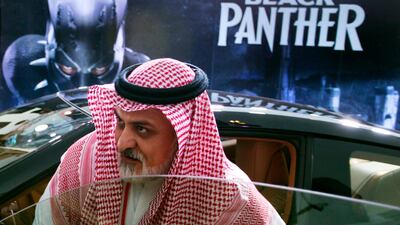The film Black Panther has broken records and milestones. It has grossed in excess of $1 billion, beating the record by Titanic to become the third highest-grossing film ever in the US and the tenth worldwide.
China is the top overseas market and has brought in more than $100 million. And now it is about to become the first film on general release in Saudi Arabia. Last weekend a VIP screening was held and in the coming month, it will open to the public.
The film – and more importantly, the reactions and commentary around it – tell us a lot about the current world.
It is set in the fictional land of Wakanda, which is light years ahead of the world in terms of technology and development because of a special resource it holds called verbanium. To protect its people and the power of the metal, it has kept it a secret. The film opens with the myths of Africa and the power of the African people.
I had goosebumps watching it. My own family traces its heritage to Tanzania and I felt overwhelmed by emotion at the domination on the global platform of an African story.
In the US, the initial celebration gave way to an emotional and even angry discourse. There was jubilation at the central commentary on the black experience and a cheer that Hollywood had finally produced the film that was wanted and needed.
But the discourse also asked why the heroes were from Wakanda, self-contained and separate from white America. Why was the black American who sought global revolution and a righting of historic oppressions cast as the angry, villainous thug? The answer was resounding: the American experience, even from the perspective of a black character, does not need to detract from the African experience.
Predictions about its reception in China were preconceived: it was assumed Hollywood could not lead the box office in China with black characters. In the promotional materials for Black Panther, the imagery of black characters was played down.
But Chinese writers themselves reacted by pointing out that box office takings showed the film was one of the most popular ever.
Women, especially black women, have cheered at the depiction of strong female characters, who are given nuance and variety.
___________________________
Shelina Janmohamed is a weekly columnist for The National:
Five decades after the 'rivers of blood' speech, prejudice still festers in Britain
Instead of maligning women who refuse to 'settle', let's encourage men to step up
Am I a supermum? More importantly, do I want to be?
___________________________
The selection of the film to lead the reimagining of the cinema industry in Saudi Arabia was also fascinating. It was not about righting the wrongs of racism, about gender or about rebalancing the global narratives of different people. The chief executive of the theatre operator that organised the VIP screening explained that the choice of film was not random: “It is the story of a young prince who transforms a great nation”.
It would not be too far a stretch to join the dots. With recent announcements of the women’s driving ban being lifted, female robots being given citizenship and futuristic cities being built run by artificial intelligence, is the subtext that the future of the Kingdom is a kind of idealistic Wakanda in the desert?
But cultural choices have unexpected, difficult and unpredictable ripple effects. The choice of airing a film that centres on a black perspective in a region which has a deep-rooted and challenging history when it comes to Africa will surely ignite conversations, even as former taboos are being broken.
The fierce female characters – their clothing, their military prowess, their leadership, their directive decision-making, their wit, their technological leadership – all elevated through the status offered by the superhero paradigm and the real world adulation of the film itself - cannot but lay the groundwork for a radical change in the discussion of women’s roles in real life.
Such cultural shifts are characterised as soft rather than hard power, which is governed by military power. Vision, aspiration, emotion and even love underpin soft power. China is already redefining its place with these softer, more subtle, cultural approaches and distancing itself from cultural stereotypes with a more globalist approach.
The vision of Wakanda, in a region where many of the themes of technology, gender and race still remain questions to be answered, is a complicated one. It just remains to be seen where the verbanium is hidden.
Shelina Janmohamed is the author of Love in a Headscarf and Generation M: Young Muslims Changing the World


